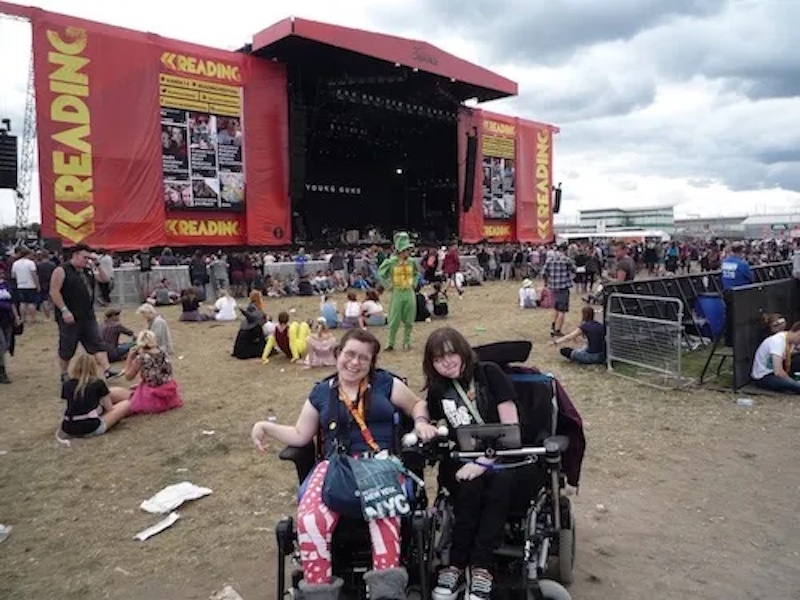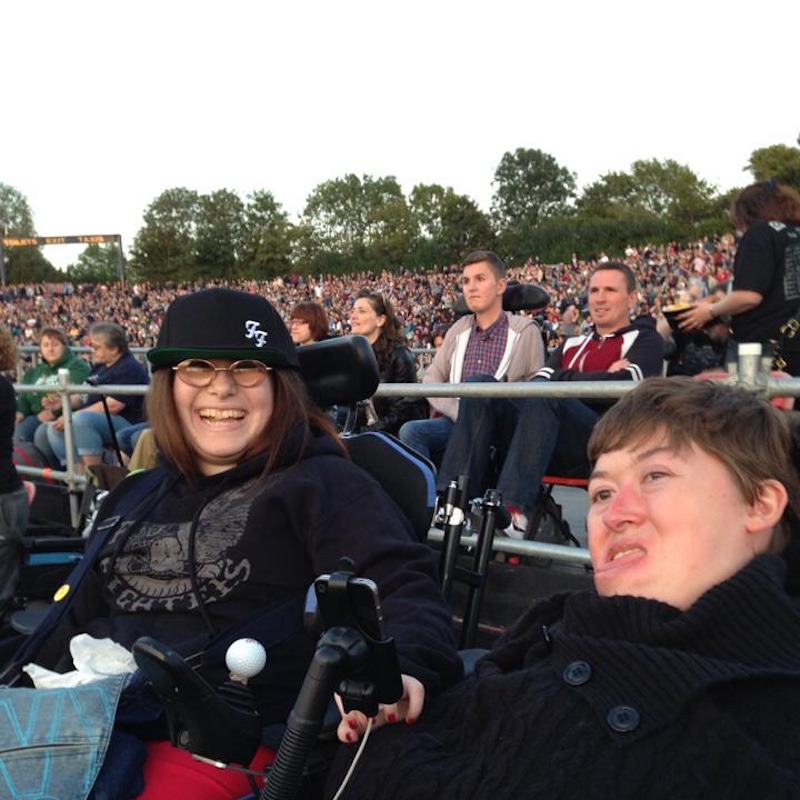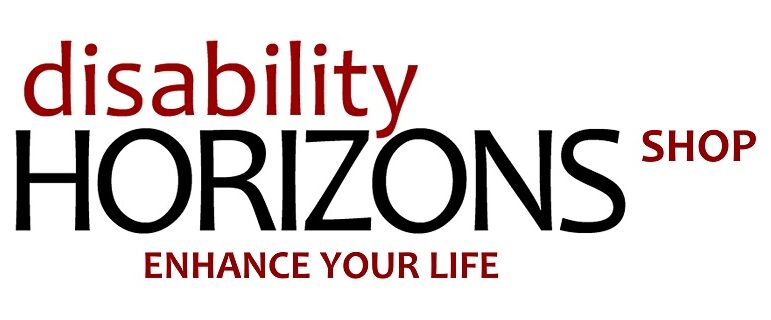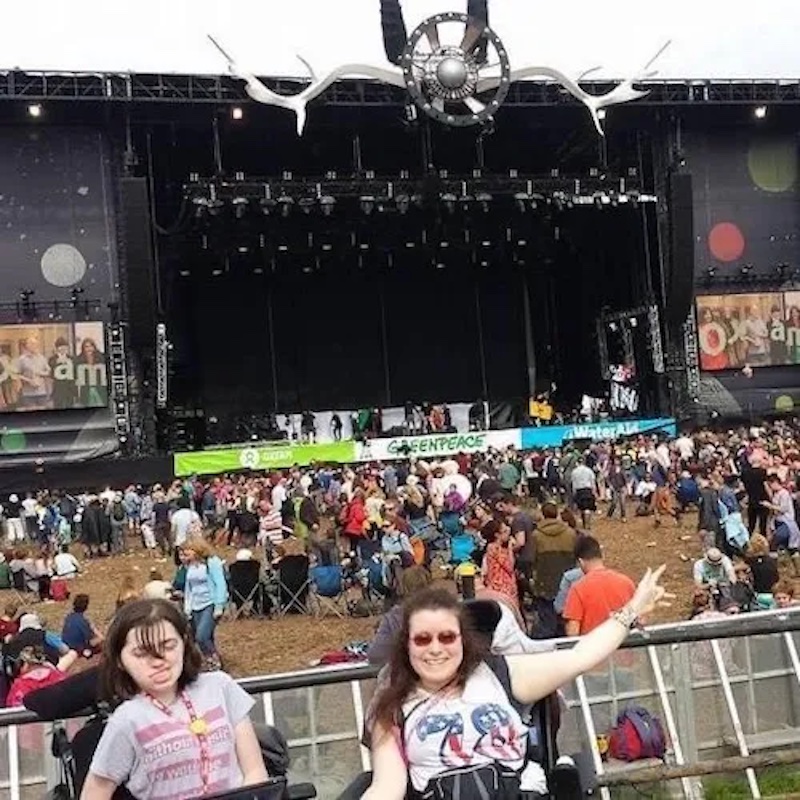Freelance journalist and blogger, Emma Purcell, who lives with cerebral palsy and is registered blind, is a passionate advocate for accessible music experiences. She shares her journey of how live music became a source of joy, expression, and empowerment – and why accessibility in music matters now more than ever.
My love of live music began at the age of 15 when a schoolmate invited me to a Calvin Harris gig in Bournemouth. As a child, I had grown up believing that gigs, festivals, and crowded venues were not places for people like me. I assumed that disabled people simply didn’t attend concerts—that these vibrant spaces were off-limits. But that night in Bournemouth changed everything.
It brought me feelings I’d never felt before. The pulsing beats, the electric energy in the air, the collective joy of a crowd moving as one—it was like being transported into another world. For the first time, I wasn’t thinking about accessibility or barriers. I wasn’t standing out. I was just there, immersed in the moment, part of something bigger. That night, I found a new kind of home.
Music as joy and expression
Live music is magical. It’s the combination of the thumping bass you feel through your chest, the dazzling lights dancing overhead, and the emotional waves that hit when a song you love plays. It’s the shared connection with complete strangers, all united by lyrics and rhythm. For me, music has always been more than just entertainment—it’s a form of expression, of therapy, of identity.
In a world that can feel isolating for disabled people, especially in public and social settings, music has been my constant companion. It gives me a voice when words fall short. It lifts my spirits when things feel heavy. It makes me feel seen, heard, and whole. Over the years, I’ve built playlists that narrate my life – songs that represent hope, heartbreak, ambition, and rebellion. Music has helped me grieve, heal, and celebrate.
From personal passion to public advocacy of accessible music experiences

Over time, my love of live music naturally evolved into something more purposeful. As I attended more gigs and festivals, I began to reflect not only on the joy they brought me, but also on the barriers that still exist for disabled fans.
I started sharing my personal experiences online, writing about both the highs and the hurdles – how accessible the venues were, the quality of viewing platforms, ease of booking, and general atmosphere from a disability perspective.
These reflections became a regular feature on my blog, Rock For Disability, where I’ve included accessibility reviews as part of my event write-ups. I want others to feel informed, prepared, and encouraged to attend music events themselves.
My goal has never been to criticise for the sake of it, but to raise awareness of what works well and what could be improved, all through the lens of lived experience.
I’ve also had the opportunity to write occasional pieces for Disability Horizons, where I’ve documented some of my most memorable events, like my experience at Reading Festival 2012. That article in particular allowed me to express just how powerful and emotional a well-planned, inclusive music event can be for disabled attendees.
While I haven’t formally advised venues or sat on industry panels, my advocacy has always been rooted in storytelling—sharing what it’s really like to navigate these spaces as a disabled music lover. In doing so, I hope to play a small part in encouraging change, one review and one reader at a time.
The joy is worth it
I won’t sugar-coat it: the planning and booking process of accessible music experiences can still be stressful and daunting. Trying to navigate websites that lack clear accessibility information or contacting venues that don’t always understand your needs can drain the excitement out of an event before it even begins. But I’ve learned to persevere – because once you’re there, the joy is absolutely worth it.
Every time I enter a venue now, I carry not only my own excitement but the hope that my presence is making a quiet statement – we belong here. Disabled people have every right to dance, cheer, and lose themselves in the music, just like everyone else.
Changing the tune

What I want people to understand – especially friends and relatives who still assume that concerts and festivals “aren’t for us” – is that they’re wrong.
Accessibility isn’t a luxury; it’s a right. Inclusion doesn’t just benefit people with disabilities; it enriches the entire music culture. When you design spaces with everyone in mind, you create a more welcoming and vibrant experience for all.
The world of live music is evolving, slowly but surely. And I’m proud to be part of that change, not just as a fan, but as someone who shares the rhythm of this journey with others.
My path with music has taken me from the edge of exclusion to the heart of the crowd, from silence to song, from frustration to fulfilment.
So if you’re someone who loves music but has felt that it’s out of reach because of your disability, I want you to know: You are not alone. You deserve to feel that beat, that bass, that belonging. Don’t let your disability stop you from experiencing the joy of music. The stage is for all of us.
Head to Crip Life™ to view more work from Emma Purcell and follow Crip Life™ on Facebook, Threads, Instagram and LinkedIn.

